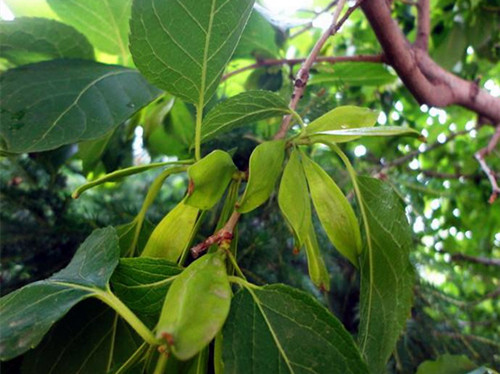A plant in the family Eucommiaceae, Eucommia ulmoides has been used in traditional Chinese medicine for over 2000 years. Traditional treatments have included the leaves, stem, and flower, which are consumed as tea in China, Korea, and Japan. The main active constituent of this plant is chlorogenic acid, which was first discovered by a group of Chinese herbalists in 1998. This plant contains over 150 compounds, including lignans, iridoids, phenolics, steroids, flavonoids, and terpenoids,other active ingredients of Eucommia ulmoides include geniposidic acid, iridoids, and chlorophyll. Further, this plant also has immunoregulation and anti-inflammatory properties.

Eucommia leaf
Is eucommia-ulmoides extract bad for the kidneys or liver? The answer depends on your health. In a study, polysaccharides from the plant increased antioxidant activity in rabbit kidneys and reduced MDA levels. In addition, the plant’s polyphenols and flavonoids are known to reduce the amount of free radicals in the body. Researchers from Korea have discovered that the leaves and barks of Eucommia ulmoides are hepatoprotective.
An active compound found in Eucommia ulmoides is aucubin, which has been reported to possess antihypertensive activity. The plant contains iridoids which stimulate cell proliferation on ESF-1. If you’re wondering whether eucommia extract is bad for the kidneys and the liver, there’s good news and bad news. Some studies have suggested that the herb may actually have health benefits. For instance, it inhibits inflammatory cells and promotes the growth of collagen fibers. Furthermore, it increases protein expressions of nuclear Nrf2 and HO-1. In addition, it increases liver and kidney SOD and mRNA expression of Col I, III, and IV. Further, this extract also inhibits the protein expression of TGF-b1 and a-SMA. Moreover, it is also known to improve renal injury caused by a high-purine diet. Although the mechanism of action for Eucommia ulmoides is not fully understood, it has been found to inhibit the lipid accumulation in the liver of rats and regulate the activity of the ER stress response system. The benefits may work due to its natural physiological property:
- Anti-inflammatory
The anti-inflammatory effects of Eucommia-ulmoides leaf extract have been studied for their ability to inhibit splenic lymphocyte proliferation and ER stress. In animal studies, Eucommia-ulmoides extracts suppressed liver glucotoxicity and insulin resistance in diabetic mice. These findings suggest that the plant is an effective anti-inflammatory agent for the liver and kidney. - Anti-fungal
In vitro studies have demonstrated antifungal effects of E. ulmoides. The chlorogenic acid extract of EUcommia ulmoides leaves has a broad-spectrum antibacterial effect on pathogenic bacteria such as aeromonas, Aeromonas hydrophila and Vibrio anguillae, which can replace antibiotics to effectively improve the immunity of cultured fish. - Antioxidant
The polysaccharides in E. ulmoides extract enhanced antioxidant activity in rabbit kidneys and liver. In addition, the polysaccharide reduced MDA content in kidney tissues. Polyphenols, lignans, and flavonoids are active antioxidants in this plant. They are important in reducing oxidative stress.
- Dandelion Extract: What It Is, Benefits, Uses and Side Effect - April 23, 2024
- Is Berberine Extract Help For Weight Loss? - April 11, 2024
- Why Is Pysllium Husk Powder A Popular Meal Replacement Ingredient? - April 3, 2024


